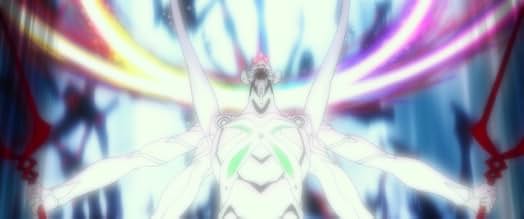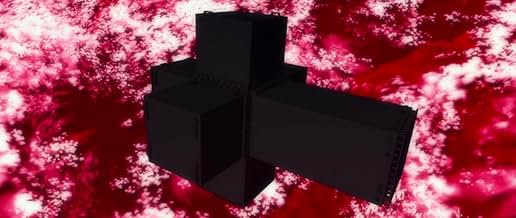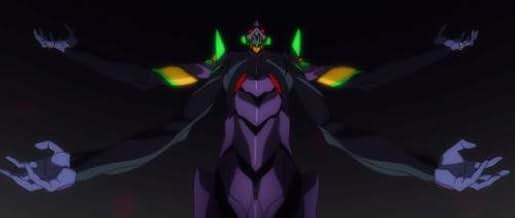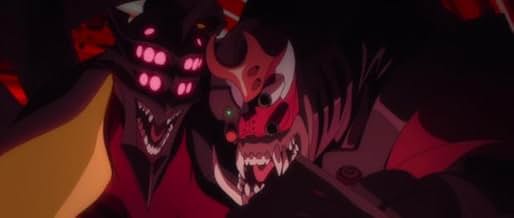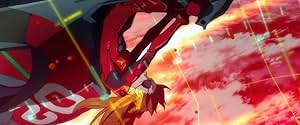VALUTAZIONE IMDb
6,9/10
20.566
LA TUA VALUTAZIONE
Sono passati quattordici anni dal vicino terzo impatto. La maggior parte del mondo è cambiata tranne Shinji Ikari che si risveglia, non invecchiato in un ambiente nuovo e strano.Sono passati quattordici anni dal vicino terzo impatto. La maggior parte del mondo è cambiata tranne Shinji Ikari che si risveglia, non invecchiato in un ambiente nuovo e strano.Sono passati quattordici anni dal vicino terzo impatto. La maggior parte del mondo è cambiata tranne Shinji Ikari che si risveglia, non invecchiato in un ambiente nuovo e strano.
- Premi
- 2 candidature totali
Megumi Ogata
- Shinji Ikari
- (voce)
Hiro Yûki
- Makoto Hyuga
- (voce)
Miki Nagasawa
- Maya Ibuki
- (voce)
Akio Ôtsuka
- Kouji Takao
- (voce)
Anri Katsu
- Hideki Tama
- (voce)
Mugihito
- Keel Lorenz
- (voce)
Recensioni in evidenza
I feel like most of the hate for 3.0 comes from fans having to wait so long for the follow-up - this movie is very daring, taking this franchise in a very different direction and forming a more original take for these rebuild movies.
Unfortunately such a sudden change is tough to pull off in just 90 minutes, especially when most of the movie is confined to slower scenes focusing on the relationship between Shinji and Kaworu. Plus, the movie ends on what feels like a very abrupt 'conclusion', and it's painfully clear that this was intended to be released alongside 3.0+1.0.
The final nail in the coffin, however, isn't really related to this movie at all - it's the way that fans were forced to wait so long for the follow up - and it was only in the next movie that the many questions that bugged fans began to get given answers. 3.0 is not a great individual movie, and definitely works best when 3.0+1.0 is watched shortly afterwards.
However, this movie is still a great movie. The gorgeous visuals/soundtrack elevate the experience of watching 3.0 greatly, and it's slower pacing to focus on a movie confined character-focused story made for a unique change to this franchise. The animation is as good as ever (the cgi really isn't that bad guys), and this alternate (yet reminiscent) take on Shinji and Kaworu's relationship gives their characters far more depth.
It's not a perfect movie, but it's a damn good one and is certainly better with the added worldbuilding of 3.0+1.0.
9/10.
Unfortunately such a sudden change is tough to pull off in just 90 minutes, especially when most of the movie is confined to slower scenes focusing on the relationship between Shinji and Kaworu. Plus, the movie ends on what feels like a very abrupt 'conclusion', and it's painfully clear that this was intended to be released alongside 3.0+1.0.
The final nail in the coffin, however, isn't really related to this movie at all - it's the way that fans were forced to wait so long for the follow up - and it was only in the next movie that the many questions that bugged fans began to get given answers. 3.0 is not a great individual movie, and definitely works best when 3.0+1.0 is watched shortly afterwards.
However, this movie is still a great movie. The gorgeous visuals/soundtrack elevate the experience of watching 3.0 greatly, and it's slower pacing to focus on a movie confined character-focused story made for a unique change to this franchise. The animation is as good as ever (the cgi really isn't that bad guys), and this alternate (yet reminiscent) take on Shinji and Kaworu's relationship gives their characters far more depth.
It's not a perfect movie, but it's a damn good one and is certainly better with the added worldbuilding of 3.0+1.0.
9/10.
14 years after the Third Impact, Shinji Ikari awakens in an unfamiliar world where he's blamed for the destroyed world. Misato Katsuragi now leads an organization, Wille, along with several other former Nerv members including Asuka in a battle against Nerv and Shinji's father Gendo. When Shinji is rescued from Wille by Rei (or what appears to be Rei) Shinji is taken to the ruins of Nerv headquarters where Gendo is still working with Rei and Kaworu Nagisa on plans to bring about Human Instrumentality.
Evangelion: 3.0 You Can (Not) Redo, the third in Hideaki Anno's Rebuild of Evangelion film series, is probably the most ambitious of the series yet with the moviemaking a fourteen year time jump and creating a desolate red landscape with the characters we've come to know unrecognizable in the time since we've last seen them. While certainly ambitious, I find myself at odds with myself over the end product. On the one hand the movie goes into a bold direction the series has not yet traversed, but on the other hand I can't really say it does it well.
When the movie starts, we're thrown into an elaborate fight scene in Earth orbit with Asuka and another Eva pilot, Mari (who was introduced in the previous film, but factored so little into the plot I didn't even mention her in the previous review) fighting against an unknown enemy while escorting a package back to Earth. In terms of opening sequences it's a well-choregraphed sequence that's unlike any of the other fight sequences we've seen in the TV series or other Rebuild films so it gets off on the right foot....and then Shinji comes into the story. When Shinji comes into the story not only are we thrown into an unfamiliar environment with Misato Katsuragi piloting a ship called the "Wunder" now carrying a hardened edge and telling Shinji to "do nothing" which leads into a lengthy fight sequence against more nameless enemies before we're given very vague exposition on the "Third Impact" Shinji caused in the last movie that completely ignores the post credit scene where Kaworu stopped the Third Impact which leads to lingering questions that are never really answered over the course of the film. Even the time jump feels like this movie is detached from the other two films and dangling plot threads are just brushed by the wayside.
Despite the many missteps taken by Evangelion 3.0, I do think it does some things well. Shinji's relationship with Kaworu Nagisa was a large point of praise in episode 24 of the TV series, and the film expands on that relationship here giving us more time with Kaworu and Shinji in some truly amazing scenes such as the scenes of the two of them playing pion together or watching the stars. It's unfortunate that there aren't more of these types of character moments with other characters and instead the movie often feels like it's ambling along in search of a direction. Despite being the shortest of the Rebuild of Evangelion film series, Evangelion 3.0 feels like the longest because there's a barrier erected between the audience and characters that never really gives way through the entirety of the running time. The cold indifference with which Shinji is treated by Wille coupled with Shinji's regression to a state of helplessness feels like it's there simply to drive Shinji to Gendo and Nerv because it needs Shinji to bring about the Fourth Impact. Why exactly? I'm not sure, granted Gendo says it's to reunite with his wife Yui, but given the state of the post Third Impact world a Fourth Impact feels like it'd be putting a hat on a hat at this point. I wasn't particularly invested in the characters making up Wille because despite them being characters we've come to know over the course of two films and the TV series, for all intents and purposes they may as well be different characters.
Evangelion 3.0 is frustrating. While the film takes a massive departure from the original narrative of the series going into new territory, it does so rather sloppily brushing aside the plot threads from the previous two films and leaving us in a state of confusion for most of the runtime that leaves us not only wondering what's going on but why should we care. There are glimpses of greatness such as the elaboration on Kaworu and Shinji's relationship, but for the most part the movie feels mostly like a "bridge" episode of this film series whose job is only to keep the seat warm until the real sequel comes out.
Evangelion: 3.0 You Can (Not) Redo, the third in Hideaki Anno's Rebuild of Evangelion film series, is probably the most ambitious of the series yet with the moviemaking a fourteen year time jump and creating a desolate red landscape with the characters we've come to know unrecognizable in the time since we've last seen them. While certainly ambitious, I find myself at odds with myself over the end product. On the one hand the movie goes into a bold direction the series has not yet traversed, but on the other hand I can't really say it does it well.
When the movie starts, we're thrown into an elaborate fight scene in Earth orbit with Asuka and another Eva pilot, Mari (who was introduced in the previous film, but factored so little into the plot I didn't even mention her in the previous review) fighting against an unknown enemy while escorting a package back to Earth. In terms of opening sequences it's a well-choregraphed sequence that's unlike any of the other fight sequences we've seen in the TV series or other Rebuild films so it gets off on the right foot....and then Shinji comes into the story. When Shinji comes into the story not only are we thrown into an unfamiliar environment with Misato Katsuragi piloting a ship called the "Wunder" now carrying a hardened edge and telling Shinji to "do nothing" which leads into a lengthy fight sequence against more nameless enemies before we're given very vague exposition on the "Third Impact" Shinji caused in the last movie that completely ignores the post credit scene where Kaworu stopped the Third Impact which leads to lingering questions that are never really answered over the course of the film. Even the time jump feels like this movie is detached from the other two films and dangling plot threads are just brushed by the wayside.
Despite the many missteps taken by Evangelion 3.0, I do think it does some things well. Shinji's relationship with Kaworu Nagisa was a large point of praise in episode 24 of the TV series, and the film expands on that relationship here giving us more time with Kaworu and Shinji in some truly amazing scenes such as the scenes of the two of them playing pion together or watching the stars. It's unfortunate that there aren't more of these types of character moments with other characters and instead the movie often feels like it's ambling along in search of a direction. Despite being the shortest of the Rebuild of Evangelion film series, Evangelion 3.0 feels like the longest because there's a barrier erected between the audience and characters that never really gives way through the entirety of the running time. The cold indifference with which Shinji is treated by Wille coupled with Shinji's regression to a state of helplessness feels like it's there simply to drive Shinji to Gendo and Nerv because it needs Shinji to bring about the Fourth Impact. Why exactly? I'm not sure, granted Gendo says it's to reunite with his wife Yui, but given the state of the post Third Impact world a Fourth Impact feels like it'd be putting a hat on a hat at this point. I wasn't particularly invested in the characters making up Wille because despite them being characters we've come to know over the course of two films and the TV series, for all intents and purposes they may as well be different characters.
Evangelion 3.0 is frustrating. While the film takes a massive departure from the original narrative of the series going into new territory, it does so rather sloppily brushing aside the plot threads from the previous two films and leaving us in a state of confusion for most of the runtime that leaves us not only wondering what's going on but why should we care. There are glimpses of greatness such as the elaboration on Kaworu and Shinji's relationship, but for the most part the movie feels mostly like a "bridge" episode of this film series whose job is only to keep the seat warm until the real sequel comes out.
Finally new material after years of remakes and recycled material and reshuffled scenes.
It is glorious to behold!
But, at the same time, it was a whole lot of setup and build up for the final part in the series. So, it didn't have as much bang as I would have liked.
Overall, it's very true to what came before, and it's nice to see these characters doing something new even if it was a bit of a tease to wait for the final movie.
It is glorious to behold!
But, at the same time, it was a whole lot of setup and build up for the final part in the series. So, it didn't have as much bang as I would have liked.
Overall, it's very true to what came before, and it's nice to see these characters doing something new even if it was a bit of a tease to wait for the final movie.
The Rebuild saga blazes onward in Anno's world flipping master act. This is the world of Evangelion unlike anything that's been done before, boasting a new, clear and confident vision that brings our heroes and anti-heroes through endless strife and the most horrific of imaginable emotional confrontations. At times it's hard to watch for that reason, but the fact that an 'out' even exists, in all of its mysterious grandeur, shows us that this doesn't have to be the end
and it's already gone beyond THE End that we've previously been met with.
Atmosphere is what the entire movie is about. Dialogue is minimal, and much is left to the visuals to tell the story of the Fourth Impact. Those visuals are quite unlike much else I've seen in a film, carrying on Evangelion's hellish, dreamlike tradition of an original, complex, and thought-provoking art direction. The cryptic nature of every artistic level, be it writing, animation, design, or music cues, that the feature works on, recalls once again, the work of Stanley Kubrick and his 'Kubrick's Cube' of visual parallelism. Aside for some visual nods to Kubrick's work (2001: A Space Odyssey, in particular), Hideaki Anno produces a visual wonder through animation, as he has with the previous Evangelion entries (and the parallels between NGE and Rebuild, in their universe hand-offs, progressions, and quantum entanglements), and goes above and beyond. It's truly a masterpiece worthy of seemingly endless dissection.
One shot that stands out in particular for me is Shinji, listening to his Walkman in the foetal position in the ruins of NERV HQ as the green grass that has grown through the oppressive concrete floor over time rustles softly in the wind. It's melancholic and establishes the feeling of the film's middle act- its heart. Between that is the confusion of being in Shinji's shoes and facing a world fourteen years passes, for what is mere moments for him. It is effectively soul-crushing, driving one to desire a brighter future for all who still live on the Earth; but there's no way it will ever be reached without a battle hard-fought.
This is much the story of two particular characters, Shinji and Kaworu than the others and while at times that can feel disappointing, to recognize the importance of the plot's gaze is essential to understanding where the Rebuild is going. For every time I crave more of Mistato's development or an appearance from Kaji, the look back toward Shinji and Kaworu is ultimately as fulfilling. Visually, the movie presents so much to analyze and merely take in, that I feel we'll have enough to puzzle over right up until 4.0— Final. It's an absolute beauty, and to watch it in anything less than high definition is more than a disservice.
As if the startling premise wasn't enough of a radical change, the final 20 or so minutes takes Evangelion to unheard of heights and, in some cases, lows. These are the best kinds of each.
Though I can understand the dislike for this movie from fans of Evangelion, I urge them to look back upon it with eyes and a mind free of expectations and see it as something that isn't meant to be the Evangelion we know- the point of the movie is to venture into the unknown, not follow the path we've seen in Neon Genesis; from the end of 2.22, it would seem this was made clear.
It's new, it's mysterious, and quickly advancing toward a new ending that could be the end of all things, the breaking of the cycle that we've been experiencing for the past 18 years, across anime, manga, and feature film. But what is the element that Shinji must perform to finally defy every quantifiable expectation? Let's see what Mr. Anno has to present him.
"Everybody finds love in the end..."
Atmosphere is what the entire movie is about. Dialogue is minimal, and much is left to the visuals to tell the story of the Fourth Impact. Those visuals are quite unlike much else I've seen in a film, carrying on Evangelion's hellish, dreamlike tradition of an original, complex, and thought-provoking art direction. The cryptic nature of every artistic level, be it writing, animation, design, or music cues, that the feature works on, recalls once again, the work of Stanley Kubrick and his 'Kubrick's Cube' of visual parallelism. Aside for some visual nods to Kubrick's work (2001: A Space Odyssey, in particular), Hideaki Anno produces a visual wonder through animation, as he has with the previous Evangelion entries (and the parallels between NGE and Rebuild, in their universe hand-offs, progressions, and quantum entanglements), and goes above and beyond. It's truly a masterpiece worthy of seemingly endless dissection.
One shot that stands out in particular for me is Shinji, listening to his Walkman in the foetal position in the ruins of NERV HQ as the green grass that has grown through the oppressive concrete floor over time rustles softly in the wind. It's melancholic and establishes the feeling of the film's middle act- its heart. Between that is the confusion of being in Shinji's shoes and facing a world fourteen years passes, for what is mere moments for him. It is effectively soul-crushing, driving one to desire a brighter future for all who still live on the Earth; but there's no way it will ever be reached without a battle hard-fought.
This is much the story of two particular characters, Shinji and Kaworu than the others and while at times that can feel disappointing, to recognize the importance of the plot's gaze is essential to understanding where the Rebuild is going. For every time I crave more of Mistato's development or an appearance from Kaji, the look back toward Shinji and Kaworu is ultimately as fulfilling. Visually, the movie presents so much to analyze and merely take in, that I feel we'll have enough to puzzle over right up until 4.0— Final. It's an absolute beauty, and to watch it in anything less than high definition is more than a disservice.
As if the startling premise wasn't enough of a radical change, the final 20 or so minutes takes Evangelion to unheard of heights and, in some cases, lows. These are the best kinds of each.
Though I can understand the dislike for this movie from fans of Evangelion, I urge them to look back upon it with eyes and a mind free of expectations and see it as something that isn't meant to be the Evangelion we know- the point of the movie is to venture into the unknown, not follow the path we've seen in Neon Genesis; from the end of 2.22, it would seem this was made clear.
It's new, it's mysterious, and quickly advancing toward a new ending that could be the end of all things, the breaking of the cycle that we've been experiencing for the past 18 years, across anime, manga, and feature film. But what is the element that Shinji must perform to finally defy every quantifiable expectation? Let's see what Mr. Anno has to present him.
"Everybody finds love in the end..."
Ah look, the black sheep of the rebuilds.
Look, this film was just ok when I watched it. It's dramatically improved by the sequel, which makes a lot of this film (notably not all) make actual sense. The goal of Anno it seems, is to show the plot from Shinji's perspective. So basically, confuse the hell out of the viewer to make us empathise with this kid. This is an interesting, but flawed decision I think. Why not trust the viewer to empathise with this traumatised, anxiety filled teenager that's forced to risk his life constantly? Is your target audience children?
Regardless, knowing what comes next does improve this aspect.
The film does start out strongly, with a fight on a scale not before seen in Evangelion. The 3D, while looking a bit cheaper, does allow for this to happen. I liked it quite a bit, and the general sense of overwhelming information at first is refreshing.
It's important to note that we are so far detached from the main series at this point, this is a fresh new experience with slightly different versions of characters that you probably love from the original series.
Don't let the feedback of this film scare you away. It's probably due to how confusing it is, and the 9 year wait people had to endure to actually get some answers.
For me, I just had to wait 5 minutes.
Look, this film was just ok when I watched it. It's dramatically improved by the sequel, which makes a lot of this film (notably not all) make actual sense. The goal of Anno it seems, is to show the plot from Shinji's perspective. So basically, confuse the hell out of the viewer to make us empathise with this kid. This is an interesting, but flawed decision I think. Why not trust the viewer to empathise with this traumatised, anxiety filled teenager that's forced to risk his life constantly? Is your target audience children?
Regardless, knowing what comes next does improve this aspect.
The film does start out strongly, with a fight on a scale not before seen in Evangelion. The 3D, while looking a bit cheaper, does allow for this to happen. I liked it quite a bit, and the general sense of overwhelming information at first is refreshing.
It's important to note that we are so far detached from the main series at this point, this is a fresh new experience with slightly different versions of characters that you probably love from the original series.
Don't let the feedback of this film scare you away. It's probably due to how confusing it is, and the 9 year wait people had to endure to actually get some answers.
For me, I just had to wait 5 minutes.
Lo sapevi?
- QuizThe post-credits preview for the next film, featuring EVA Unit 8+2 fighting, was created by motion capturing stuntmen rather than traditional animation.
- BlooperDuring the scene when Rei attacks Wunder, there is a close up shot of Shinji screaming, during the close up we didn't see his collar attached to his neck, however, after a flash of explosion, the collar magically appears.
However, this mistake only appears in the home video version.
- Curiosità sui creditiUnlike the previous two movies, where the original Japanese title cards showed in the beginning or after the prologue, in 3.0/Q the title card shows up when the film runs 30 minutes of its duration.
However, the English title card still shows up at the halfway point of the movie.
- ConnessioniFeatured in ScrewAttack's Top 10s: Top 10 Piloted Mechs (2017)
I più visti
Accedi per valutare e creare un elenco di titoli salvati per ottenere consigli personalizzati
Dettagli
Botteghino
- Lordo Stati Uniti e Canada
- 174.945 USD
- Fine settimana di apertura Stati Uniti e Canada
- 110.825 USD
- 12 gen 2014
- Lordo in tutto il mondo
- 60.648.662 USD
- Tempo di esecuzione
- 1h 36min(96 min)
- Colore
- Mix di suoni
- Proporzioni
- 2.35 : 1
Contribuisci a questa pagina
Suggerisci una modifica o aggiungi i contenuti mancanti


